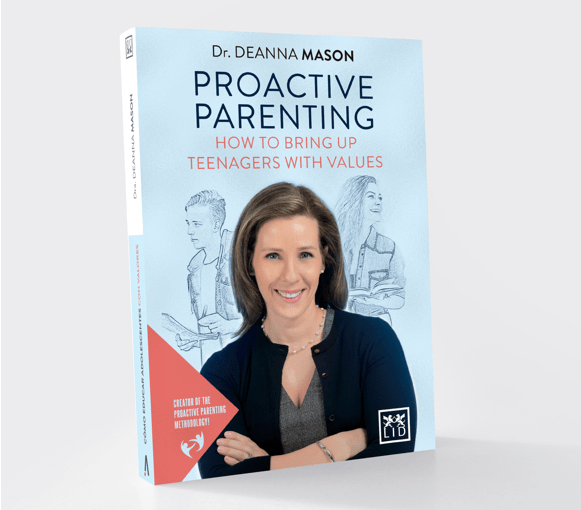Proactive Parenting: How to Raise Teenagers with Values
Deanna Marie Mason PhD
Soft cover
Cyberbullying, sexting, alcohol, drugs, unwanted pregnancies, bullying, academic disinterest, and eating disorders are just some of the worries parents face today. However, these situations or behaviors can be avoided if children are educated in values…
Keep reading19,99€
Executive Summary
Cyberbullying, sexting, alcohol, drugs, unwanted pregnancies, bullying, academic disinterest, and eating disorders are just some of the worries parents face today. However, these situations or behaviors can be avoided if children are educated in values from an early age. Dr. Deanna Mason explains how, through proactive parenting techniques, parents can prevent future behavioral problems in their children while guiding their progression towards adulthood. This is a practical guide with tools and tips to help parents successfully instill values while supporting and advising teens. The book presents real situations that teenagers confront to help parents understand what is going on inside their children and why they behave in certain ways.
You can also buy this book at:
LID EditorialHow to educate teenagers with values
Part 1 – How do I know what my child is capable of?
Chapter 1 – Explains how a parent’s role changes during adolescence. During childhood, parents directly oversee and make all relevant decisions related to their child’s socialization and welfare. However, during adolescence, parents must begin to allow their developing adolescent to start assuming more control and decision making while suffering the natural consequences of their choices, for good and for bad. Teens need practice to transition into fully formed and functional adults and will use various guides to help them throughout this process.
Chapter 2 – Describes the variance that parents can see between the chronological age of their child and their child’s developmental age. Although chronological age is easily measured in years, determining a child’s developmental age is more useful in evaluating what a child is capable of doing and what expectations are appropriate for that particular child in each moment. Tools to identify when a child is acting immaturely on purpose to avoid responsibility and when a child is still in the process of maturing is explained in detail to assist parents in knowing how to approach their child in the most effective manner.
Chapter 3 – Provides an overview of child development related to physical, emotional, intellectual, psychosocial and moral development so parents can understand what their child is capable of doing or being responsible for. Each developmental stage is described generally and defined with particular behaviors and habits specific to each stage to help parents evaluate how their child is progressing. The power of understanding your child’s development means that you can guide your child more successfully by having clear expectations based on their abilities and capabilities.
This chapter is divided into stages so parents can easily locate information related to their children. The stages include:
- End of childhood (Children age 6-9 years)
Pre-adolescence (Children aged 9-11 years)
Early adolescence (Children aged 11-13 years)
Middle adolescence (Children aged 14-16 years)
Late adolescence (Children aged 17 years and up)
Part 2 – Proactive Parenting
Chapters 4 and 5 – Describe how Proactive Parenting is directed and driven by parents to obtain the end results they desire while acknowledging and respecting the individual nature and uniqueness of each of their children. The focus of Proactive Parenting is to prevent or limit behavioral issues while teaching morals and values to raise health and happy children. Proactive Parenting is not quick-fix system that removes all conflict from families. Rather, the techniques and approaches of Proactive Parenting will help parents anticipate when problems will arise, how to minimize them, and what to do when children are veering into areas that do not match their family’s values. Proactive Parenting is designed for long-lasting results. To accomplish this goal, Proactive Parenting has three main pillars:
- Discipline and Limit Setting
Flexible Parenting Technique (Techniques that are adaptable to the needs of the family)
Feeling Confident and In Control
Each pillar is extensively described with examples to help families begin being proactive. Additionally, the importance of using the pillars together to create synergy and an internal consistency in the family is reviewed.
Chapter 6 – Goes deeper into the Proactive Parenting theory describe how teaching morals and values are intertwined with each pillar of this method to produces long lasting results. Parents who use Proactive Parenting intentionally link values to behaviors help their children internalize the value and begin to practice the behavior independently. This means that children are more likely to behave appropriately and make value-based decisions even when adults are not monitoring them because they understand the importance of their actions. This chapter reviews the developmental windows that make teaching values effortless while simultaneously improving a child’s behavior.
Chapter 7 – Integrates all the theoretical information grounding the Proactive Parenting method to give clear, directly applicable ways to begin using Proactive Parenting immediately. Specifically, this chapter covers three central tenets that will help parents achieve their goal of educating their teen with values successfully. These tenets include:
- Safety
Consistency
Shared responsibility
A visual three ringed model is presented to help parents understand how these tenets are related and interact with each other. More specifically, the three ringed model communicate how parents can adapt their parenting techniques and discipline throughout adolescence as their teen matures from pre-adolescence to late adolescence; specific examples are provided in the text to help parents get started. Together, the tenets provide a framework to assist parents in creating an internally consistent form of parenting that matches the values they desire to communicate to their children.
Additionally, this chapter addresses “Emerging Adults” or adults by chronological age (19-35 years) that are struggling to be responsible for themselves personally, emotionally, socially, and financially and how Proactive Parenting techniques can help them finalize their maturation.
Chapter 8 – Is a special section that addresses how adolescents actively propel themselves in their own development by searching for guides. In most cases, adolescents will choose one or both of their parents as guides, but in other situations, teens will choose other adults in which they have a close, reciprocal relationship. Therefore, this chapter provides 5 specific recommendations to support a teen’s own role in their development as well as how parents can assess, monitor, and guide teens through this iterative process.
Chapter 9 – Focuses on the value of prevention rather than correction. Children and teens need structure and limits to feel secure in taking risks knowing that their parents will only allow them to stretch as far as is appropriate and safe for them. When children are overindulged with too much influence, power, food, toys, etc. children can get used to a high level of attention and demand more to the detriment of everyone in the family, including themselves. This chapter reviews how to avoid overindulgence to raise strong and content children while assuring that all discipline and limit setting is educational and productive to supporting a healthy self-esteem and self-concept.
Chapter 10 – Reviews specific issues that are negatively influencing adolescents today. Each topic is generally discussed and addressed with appropriate Proactive Parenting techniques to assist parents in guiding their children towards healthy behaviors
- Health
Substance use
Unhealthy diets
- Education and work
Fantasy gap
- Internet and social media
Sexting
Cyberbullying
Social media
Video game addictions
roblematic mobile phone use
Ultimately, this book is intended to help parents feel confident and in control watching their children emerge from adolescence into adulthood because they will be prepared to take on life’s challenges and enjoy life’s beauty. Proactive Parenting allows every family, regardless of makeup or viewpoint, to use these techniques to guide their children in learning the morals and values that are appropriate for that family.
Practical guide with tools and tips to help parents
successfully instill values for only 19,90€
About the instructor
Proactive Parenting
Deanna Marie Mason PhD
More than 20 years of clinical experience helping families:
Bachelor's Degree in Registered Nursing, Master’s Degree in Pediatric Nurse Practitioner and PhD in Nursing. University professor, patient education specialist, pediatric researcher, published author and reviewer to first-line international scientific journals, continuous philanthropic activity related to health promotion and education, wife and mother of two children.



